The iLEAPS Global Colloquium series started in 2022 is a prestigious and collaborative platform that brings together leading scientists, researchers, and experts from around the world to engage in discussions and share insights on issues related to land-atmosphere interactions, ecosystem processes, and the impact of human activities on the environment. These colloquia provide a unique opportunity for participants to explore cutting-edge research, exchange ideas, and contribute to the development of innovative solutions for addressing pressing environmental challenges. Through a combination of keynote presentations, panel discussions, and interactive sessions, the iLEAPS Global Colloquium series serves as a catalyst for collaborative research and the generation of knowledge that is crucial for informing policies and strategies aimed at promoting sustainable land use and mitigating climate change.
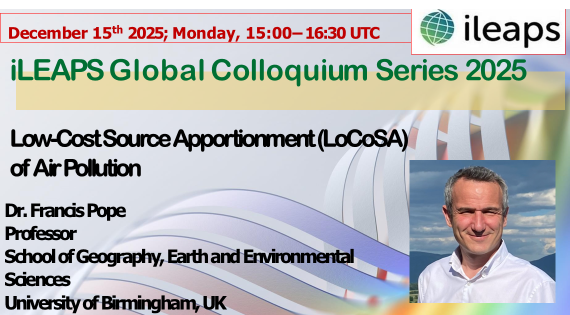
Prof. Francis Pope
Professor Francis Pope is an expert on the causes and effects of climate change, air pollution and resilient cities. He is a natural interdisciplinarian who revels in working across boundaries and institutions. He is the Environmental Health Sciences theme lead at the University of Birmingham and runs a large research group. Previously, he has held positions at world leading institutions including the University of Cambridge, and NASA’s Jet Propulsion Lab as a Caltech postdoctoral scholar. He has provided policy directed research for many government agencies and has consulted for SMEs, large companies and non-governmental organizations (NGOs). He publishes widely, with over 150 peer reviewed papers, 6 book chapters and many government reports.
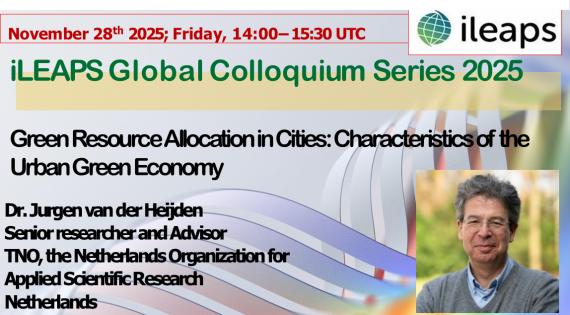
Jurgen van der Heijden, senior researcher and advisor at TNO, the Netherlands Organization for Applied Scientific Research. Educated in public law and administration at the universities of Leiden (LL.M) and Amsterdam (PhD). Between 1992 and 2014,he worked asresearcherat the law faculty andlecturerat the political science faculty of the University of Amsterdam. Between 2001 and 2005, he was seconded to the national government, and from 2006 to 2022, he worked for an engineering firm. Since then, he has been working for TNO's Strategy and Policy department, in the Sustainability and Spatial Development group. Jurgen specializes in the integrative approach, which addresses multiple problems simultaneously, such as climate adaptation and energy transition. In this context, he conducts various research projects on the idea of resources that allocate resources.
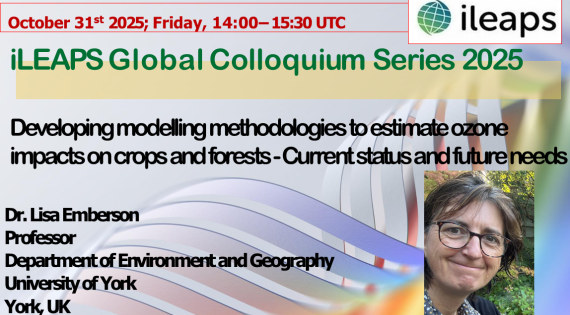
Prof. Lisa Emberson
Lisa Emberson is a Professor of Environmental Science in the Environment & Geography Dept., at the University of York in the UK. She has over 20 years’ experience in the field of modelling soil-plant-atmosphere systems for assessment of the risk of impacts of air pollution (in particular ground level ozone) and climate change. She has developed research activities in Europe, Africa, Asia and Latin America investigating the effects of a range of air pollutants (SO2, NOx, O3, SPM and fluorides) and climate change on both agro- and forest ecosystems with a view to investigating the subsequent impacts on yields and productivity and consequently social and economic systems. She continues to have an active research role in Europe, developing deposition methodologies for use within the UNECE Long Range Transboundary Air Pollution Convention and also sits on the Scientific Advisory Panel of the Climate and Clean Air Coalition providing advice on the benefit of action on Short-Lived Climate Pollutants in relation to agricultural productivity and ecosystems.
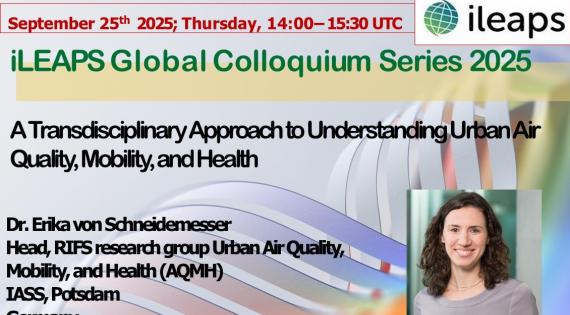
Dr. Erika von Schneidemesser
Dr. Erika von Schneidemesser joined RIFS (then IASS) in 2012, where she currently leads the RIFS research group Urban Air Quality, Mobility, and Health (AQMH). She received her PhD in Environmental Chemistry and Technology from the University of Wisconsin-Madison, USA in 2009, with a focus on the transport and source apportionment of atmospheric particulate matter. The current focus of her research group is on understanding urban air pollution, including exploring and developing the measurement capabilities of small sensors, and their application in urban areas for quantifying the effects of mobility policy on air quality and changes in exposure. The research group uses a transdisciplinary approach, to strengthen connections between science and policy, collaborating with city governments and NGOs to inform decision-making and research.
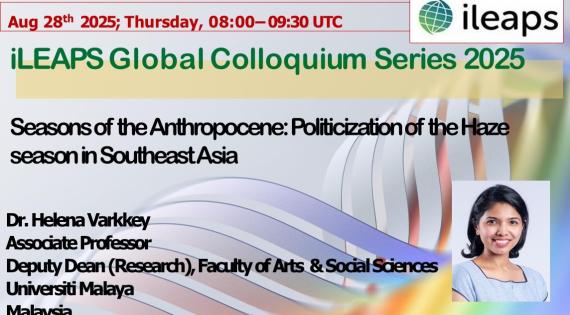
Dr. Helena Varkkey
Dr Helena Varkkey is an Associate Professor of Political Ecology at the Department of International and Strategic Studies, Universiti Malaya. Her areas of expertise include transboundary haze governance in Southeast Asia and global palm oil politics. Her monograph on “The Haze Problem in Southeast Asia: Palm Oil and Politics” was published by Routledge in 2016. Dr Helena has almost two decades of experience in qualitative research, including conducting fieldwork, interviews, and focus groups among various government and non-government stakeholders, and has built up extensive research networks in countries across ASEAN. She has edited and produced reports for the Academy of Sciences Malaysia, UNICEF, and the ASEAN Secretariat. She is currently a fellow of the Indo-Pacific Leadership Lab program organised by the East West Centre in Hawaii.
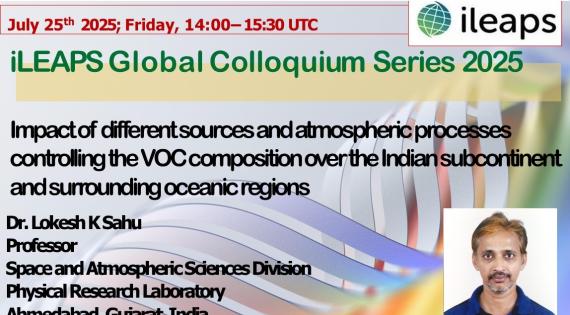
Dr. Lokesh K Sahu
Prof. Lokesh Sahu is a faculty member in the Space and Atmospheric Sciences Division in Physical Research Laboratory (PRL), Ahmedabad, India. After completing PhD from PRL, he received the Japan Society for the Promotion of Science (JSPS) fellowship to work at the University of Tokyo during 2006-2008 and as a Special Researcher during 2008-2010. He has been focused on characterizing the key emission and atmospheric processes controlling the levels of volatile organic compounds (VOCs) in different environments of India and over the northern Indian Ocean. He was involved in several research projects of NASA, Japan Science Technology (JST), Indian Space Research Organisation (ISRO), Asia Pacific Network (APN), etc. He is a member of the Atmospheric and Ocean Sciences expert committee for the Indian Arctic Expedition. Nodal Faculty for Gujarat, the National Clean Air Programme (NCAP), Ministry of Environment, Forest & Climate Change, Govt. of India. He received the NASA Group Achievement Award 2009 for outstanding accomplishments in the success of the ARCTAS mission.
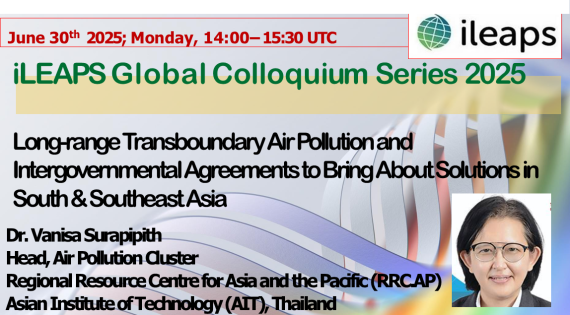
Dr. Vanisa Surapipith
Dr. Vanisa Surapipith has over 20 years of strong experience in atmospheric research with a focus on air quality
management and its link to climate. She held various positions, including policy-support environmentalist in
the Thailand Ministry of Natural Resources and Environment (MNRE), atmospheric modeler at the
International Centre for Integrated Mountain Development (ICIMOD), scientific officer at COMSATS Institute of
Information Technology (CIIT), senior researcher at National Astronomical Research Institute of Thailand
(NARIT). She contributes to international collaborations, such as with the Task Force of Hemispheric Transport
of Air Pollution (TF-HTAP), Chinese Academy of Sciences and Clean Air Asia, while continues to support
National Research Council of Thailand (NRCT) program called Hub of Talents on Air Pollution and Climate
(HTAPC).
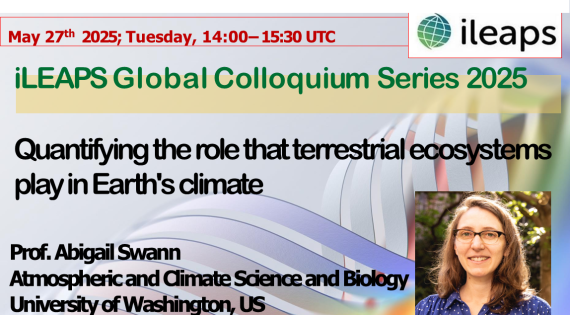
Prof. Abigail Swann
Abigail Swann is a Professor jointly appointed in Atmospheric and Climate Science and Biology at the
University of Washington and is the Endowed Professor for the College of the Environment in Climate &
Ecosystems. Her research is focused on the role that plants play in Earth's climate. She studies both the physical
climate system and the underlying biological processes that govern ecosystems and characterize their response
to environmental variability and change. She received her bachelors degree and PhD from the Earth and
Planetary Sciences Department at the University of California, Berkeley as well as a masters degree from
Columbia University in Earth and Environmental Sciences.
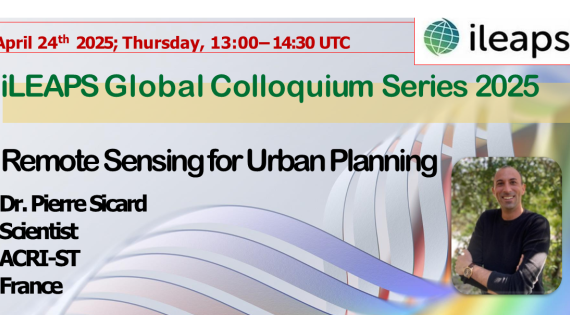
Dr. Pierre Sicard
Remote Sensing for Urban Planning
Dr. Pierre Sicard is a Senior Researcher working on air pollution and climate change impacts on forests ecosystems and on the air pollution removal capacity by urban trees by using remote sensing, modelling, surveys campaigns, and statistical analyses. He is an active communicator having the roles of: Deputy Coordinator of the RG 8.04.00 “Air Pollution and Climate Change” under the International Union of Forest Research Organizations; Management Committee COST Action CA23148 “European Network for the Integrative Approach of Urban Forestry”; involved as Expert on Clean Air in Cities (United Nations Economic Commission for Europe) and active in the EU Clean Air Forum; and Co-EiC of Environmental Research. In 2023, he obtained the Diploma of Excellence in recognition of his contribution for strengthening the excellence and performance of the National Institute for Research and Development in Forestry “Marin Dracea” (Romania).
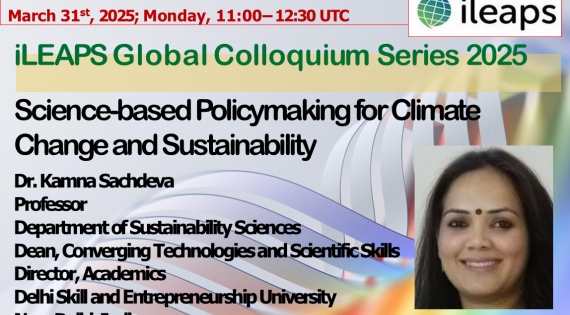
Prof. Kamna Sachdeva
Dr. Sachdeva research in the domain of climate change and sustainability. She is a Dean and Professor of “Faculty of Converging Technology and Scientific Skills” at Delhi Skill and Entrepreneurship University, Govt of NCT Delhi. She also heads department of Sustainability Sciences at Delhi Skills and Entrepreneurship University. She earned her doctoral degree from the School of Environmental Sciences at Jawaharlal Nehru University in 2008. Her contributions to atmospheric sciences were recognized early in her career when she received the DST Young Scientist Award in 2009. Dr. Sachdeva has a strong record of publications, including research papers and book chapters that focus on the intersection of science and policy. Her work and achievements have been highlighted in UNESCO’s publication "A Braided River: Universe of Indian Women in Science," underscoring her impact in the scientific community.
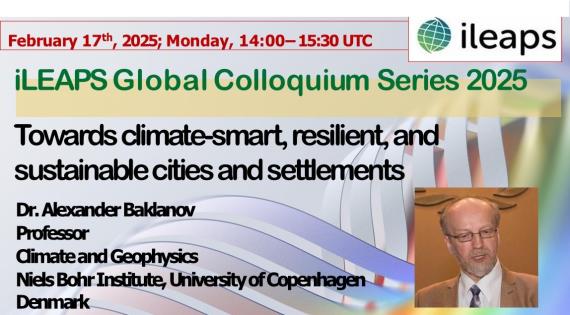
Prof. Alexander Baklanov
Alexander Baklanov is a Professor in Climate and Geophysics at the Niels Bohr Institute of the University of Copenhagen, Denmark, and during last 10 years worked in the Science and Innovation department of the World Meteorological Organization (WMO) in Geneva, Switzerland, where was responsible for urban cross-cutting research activities and programs; a visiting professor in several universities in Europe and Asia. He is a member of the International Eurasian Academy of Sciences and the Academia Europaea, Founding Editor of the Urban Climate journal, Board Member of International Association for Urban Climate. He led a number of international projects on urban climate and environmental risk (e.g. ArcticRISK, NordRisk, FUMAPEX, MEGAPOLI, EnviroRISKS, EuMetChem, EnviroHIRLAM, PEEX MP, IMTECC, IUS4CRC), a lead author for IPCC SR on Climate Change and Cities, a member of GEO Resilient Cities and Human Settlements WG, Science Advisory Board of the WCRP CORDEX URB-RCC, EU projects CARMINE, RI-URBANS, etc.
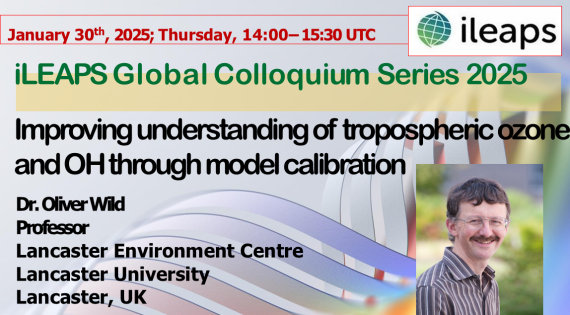
Prof. Oliver Wild
Oliver Wild is Professor of Atmospheric Science at Lancaster Environment Centre, Lancaster University, UK. He has 30 years’ experience in developing and applying numerical models of atmospheric processes to advance understanding of tropospheric composition and air quality over urban, regional and global scales. He published the first assessment of the indirect climate impacts of NOx and CO and pioneered model studies of the intercontinental transport of ozone and other oxidants, underpinning contributions to the UN/ECE Task Force on Hemispheric Transport of Air Pollution (HTAP).
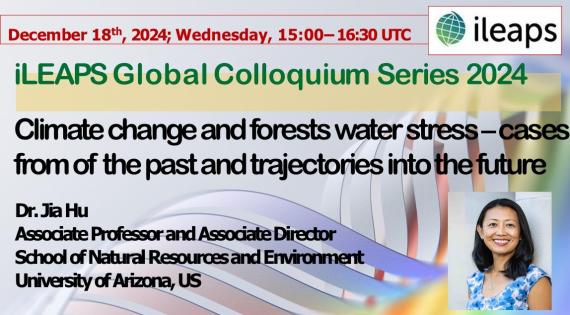
Dr. Jia Hu
Dr. Hu is an Associate Professor and Associate Director of the School of Natural Resources and Environment at
the University of Arizona (UA), Associate Professor in the Laboratory of Tree Ring Research at UA, and
Assistant Dean of Graduate Studies in the College of Agriculture, Life, and Environmental Sciences. Dr. Hu’s research broadly addresses how plants respond to changing climate by focusing on plant carbon-water relations. She has worked around the world in a range of ecosystems, from grasslands in Tibet, to forest in the
western U.S., to the cloud forests of the Galapagos Islands.
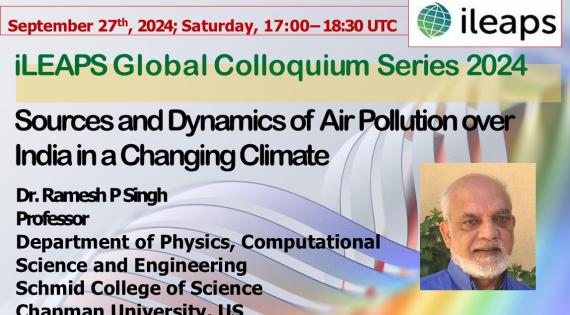
Prof. Ramesh Singh
Ramesh P Singh graduated from Banaras Hindu University, was a Post-doctoral and an AOSTRA Fellow at theUniversity of Alberta during 1981-1986. During 1986-2007 was a faculty member in the Department of Civil Engineering at IIT Kanpur. After experiencing the severity of atmospheric pollution problem while his stay in Kanpur, he started working in the field of atmospheric pollution and natural hazards related to the northern parts of India, supervised number of undergraduate and graduate students. In August 2007 he joined GMU as Professor. In Feb 2009, he moved to Chapman University, Orange, USA. He is recipients of number of awards, National Mineral, Indian Remote Sensing and Hari Om Ashram Prerit awards. He was an Alexander Humboldt and JSPS Fellow, visited Germany and Japan. He has published more than 300 papers and edited number of books, his recent book “Asian Atmospheric Pollution” published by Elsevier Sci. Pub. in 2021.
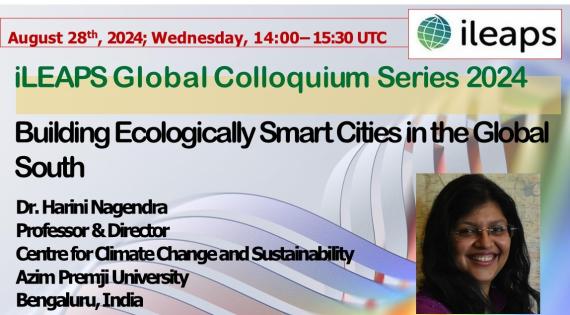
Dr. Harini Nagendra
Harini Nagendra is Director of Research Centre at the University, and leads the University’s Centre for Climate Change and Sustainability. She has received many awards including the 2009 Cozzarelli Prize from the US National Academy of Sciences, the 2013 Elinor Ostrom Senior Scholar award, and the 2017 Clarivate Web of Science award. She has written over 200 academic papers, including recent publications in Nature, Nature Sustainability, and Science, and is on Stanford University’s list of the top 2% cited scientists in the world. Harini has been a Lead Author on the IPCC AR5 reports, and a past Science Committee member of DIVERSITAS and the Global Land Programme. She engages with international science and policy through her involvement as a Steering Committee member of the Future Earth Programme for Ecosystem Change and Society, and the Future Earth Urban Knowledge Advisory Network.
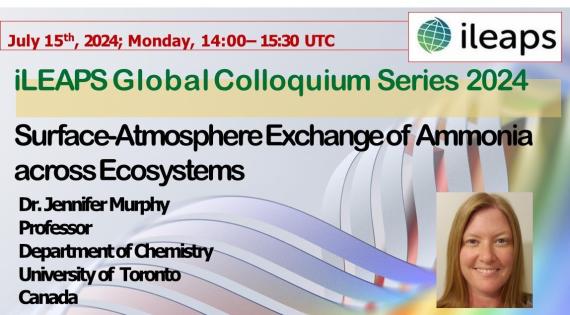
Prof. Jennifer Murphy
Jennifer Murphy is a professor of Chemistry at the University of Toronto, with interests in atmospheric chemistry, analytical techniques, and biosphere atmosphere exchange. She completed her PhD, focused on the atmospheric chemistry of ozone and nitrogen oxides, at the University of California, Berkeley in 2005.She joined the Department of Chemistry at the University of Toronto in 2007, where she held a Canada Research Chair in Atmospheric and Environmental Chemistry for ten years. In 2019, she received the American Geophysical Union Atmospheric Sciences’ Ascent Award, which recognizes excellence in research and leadership among mid-career scientists. In 2020, she was a member of the NETCARE team whose research on aerosol and climate in the Canadian Arctic was awarded the Brockhouse Canada Prize for Interdisciplinary Research in Science and Engineering.
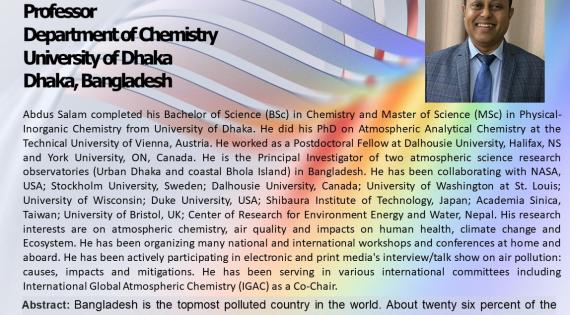
Prof. Abdus Salam
Prof. Abdus Salam is the Principal Investigator of two atmospheric science research observatories (Urban Dhaka and coastal Bhola Island) in Bangladesh. He has been collaborating with NASA, USA; Stockholm University, Sweden; Dalhousie University, Canada; University of Washington at St. Louis; University of Wisconsin; Duke University, USA; Shibaura Institute of Technology, Japan; Academia Sinica, Taiwan; University of Bristol, UK; Center of Research for Environment Energy and Water, Nepal. His research interests are on atmospheric chemistry, air quality and impacts on human health, climate change and Ecosystem. He has been actively participating in electronic and print media's interview/talk show on air pollution: causes, impacts and mitigations.
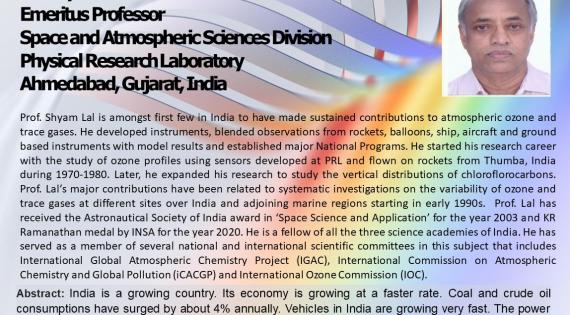
Dr. Shyam Lal
Prof. Shyam Lal is amongst first few in India to have made sustained contributions to atmospheric ozone and trace gases. He developed instruments, blended observations from rockets, balloons, ship, aircraft and ground based instruments with model results and established major National Programs. He started his research career with the study of ozone profiles using sensors developed at PRL and flown on rockets from Thumba, India during 1970-1980. Later, he expanded his research to study the vertical distributions of chloroflorocarbons. Prof. Lal’s major contributions have been related to systematic investigations on the variability of ozone and trace gases at different sites over India and adjoining marine regions starting in early 1990s. Prof. Lal has received the Astronautical Society of India award in ‘Space Science and Application’ for the year 2003 and KR Ramanathan medal by INSA for the year 2020.
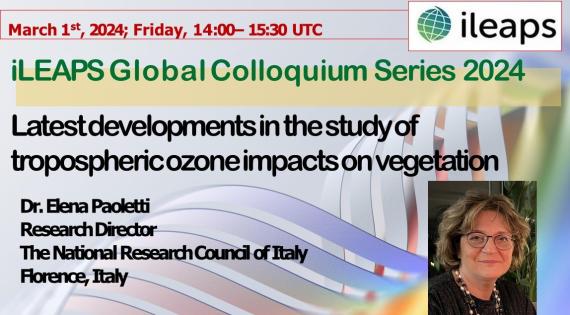
Dr. Elena Paoletti
Elena Paoletti is Research Director at the National Research Council of Italy and Responsible of the Florence Branch of the Institute of Research on Terrestrial Ecosystems. She is member of the Board of the European Forest Institute (EFI), and member of the Management Committee of the International Union of Forest Research Organizations (IUFRO) where also chairs the honors and awards committee and the scientific committee of the IUFRO World Congress in Sweden 2024. Elena has published 270 peer-reviewed papers, in journals like Nature Food, Science Advances, Global Change Biology, Environmental Pollution. Her current research interests are on tropospheric ozone impacts on vegetation, including developing novel tools and approaches as well as interactions of ozone and urban vegetation.
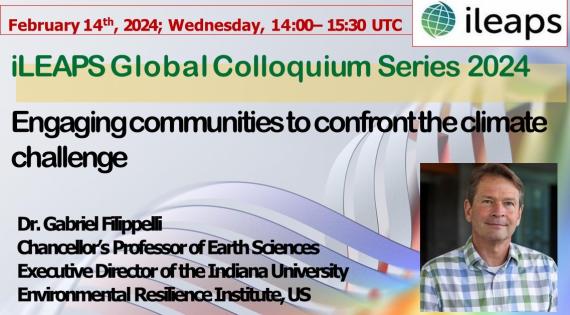
Dr. Gabriel Filippelli
Dr. Gabriel Filippelli is the Chancellor’s Professor of Earth Sciences and Executive Director of the Indiana University Environmental Resilience Institute. Author of over 200 publications, in 2022 Filippelli also published the book Climate Change and Life with Elsevier and edited Climate Resilience in Indiana and Beyond with Indiana University Press. He is the Editor-in-Chief for the journal GeoHealth, a Fellow of the International Association of Geochemistry, a 2022 Fulbright Distinguished Chair, and former National Academy of Sciences Jefferson Science Fellow, where he served as a Senior Science Advisor for the U.S. Department of State.
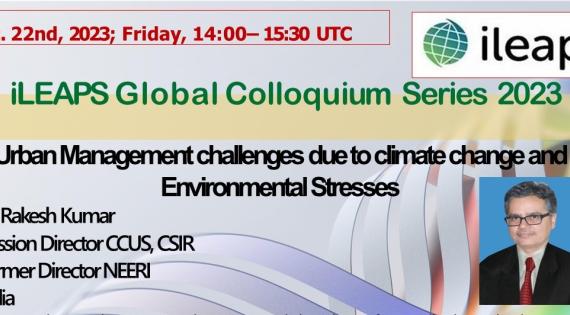
Dr. Rakesh Kumar
Dr. Kumar is the mission director for coordinating National Research Hub for Carbon Capture-Storage and use (CCUS) at CSIR. He also has served as Adjunct Professor at the Centre for Environmental Science and Engineering, Indian Institute of Technology, Bombay, India. Dr. Kumar will be talking about the challenges on urban management due to environmental stresses caused by climate change.
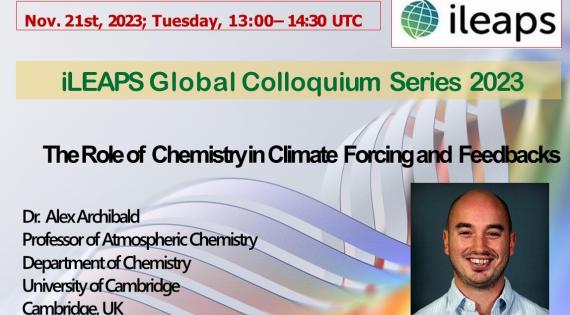
Prof. Alex Archibald
Prof. Alex Archibald is a Professor of Atmospheric Chemistry at the University of Cambridge, UK. He leads the Atmospheric Composition-Climate Modelling group and is the Science Director of the UK Chemistry and Aerosol model, widely used to simulate the interactions between atmospheric composition and climate change. His research involves the development and application of state-of-the-art chemistry-climate models to study the impacts of changes in man made emissions on the composition of the atmosphere and the affect on climate and vice-versa.
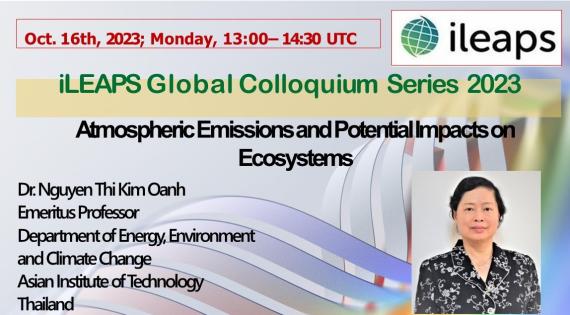
Prof. Nguyen Thi Kim Oanh
Prof. Nguyen Thi Kim Oanh, from the Asian Institute of Technology (AIT) is also a member of the science panel of the Asia Pacific Clean Air Partnership (APCAP), vice-chair of WMO-UNEP “Integrated Assessment of Black Carbon and Tropospheric Ozone”, 2011; WHO expert in the Guideline Development Group for the update of Global Air Quality Guidelines, 2021; and leading author of UNEP “Atmospheric Pollution in the Asia Pacific: Science-Based Solutions”, 2019. She was a Fogarty Research scholar on her sabbaticals at the University of Washington in Seattle and University of Illinois at Urbana-Champaign, USA (2004), and a visiting professor at the Institute for Advanced Sustainability Studies, Germany (2012).
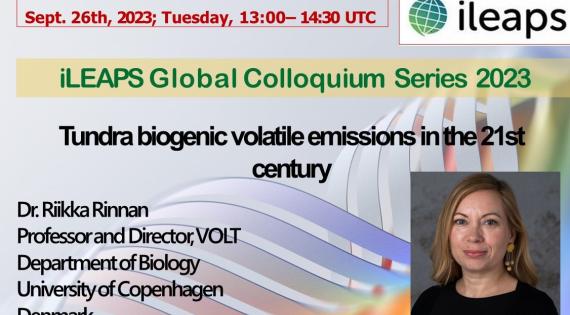
Prof. Riikka Rinnan
Riikka Rinnan is a professor in Ecosystem-Atmosphere interactions and the director of the Center of Excellence in Volatile Interactions (VOLT) at Department of Biology, University of Copenhagen, Denmark. Her PhD focused on peatland vegetation responses to environmental changes and their effects on CO2 and methane fluxes. Rinnan’s current research focuses on the abiotic and biotic controls of VOC production and consumption in plants, soils, and ecosystems. She holds an ERC consolidator grant and has received the Elite Research Award from the Danish Ministry of Science, Innovation and Higher Education.
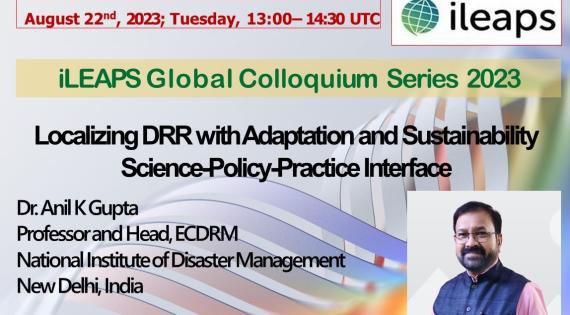
Prof. Anil K Gupta
Dr. Gupta is a resilience and sustainability strategist, with around 3 decade’s experience in diverse environment working with Government, corporate, academia, research and international cooperation. He is the Director of Projects and Centre of Excellence, Head of Environment, Climate and Sustainability Portfolio, International Cooperation, Technical Advisory & Consultancy Services as Full Professor of India’s National Institute of Disaster Management of Government of India, based in New Delhi. He also serves as the head of Centre for Disaster and Health at NIDM. He has over 200 publications, including books, manuals, policy papers, high-impact journal papers, and globally referenced articles.
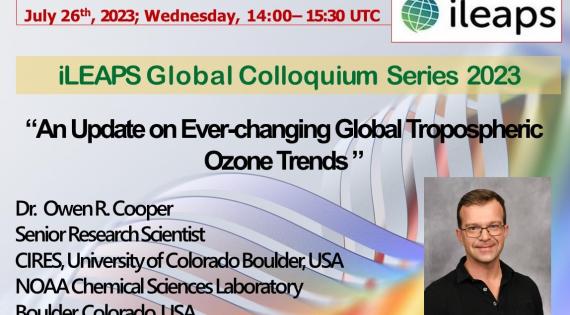
Dr. Owen R. Cooper
Dr. Cooper currently serves as a CIRES Senior Research Scientist at the University of Colorado, Boulder. He
works closely with government scientists in NOAA’s Chemical Sciences Laboratory in Boulder, Colorado With
the goal of conducting scientific research that is highly relevant to public health issues and policy
development. Owen's interests pertain to regional and intercontinental transport of atmospheric trace gases,
dust and aerosols trends in the US. Owen is an author on 123 peer reviewed publications and has
contributed to several assessment reports including the fifth and sixth IPCC assessment reports, the annual
State of the Climate Reports, and the Task Force on Hemispheric Transport of Air Pollution.
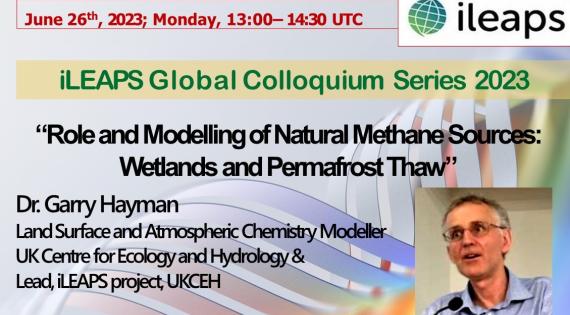
Dr. Garry Hayman
Dr. Hayman is a land surface and Earth system modeller, with research interests covering land atmosphere
interactions (particularly biogeochemical), model development and the use of measurements, including Earth
Observation and remote sensing data, for model evaluation. Garry is currently the UKCEH lead investigator for
projects on Earth System modelling and on peatlands He has also been involved in research projects
concerning methane to develop and evaluate the methane wetland emission parameterisation in the JULES
land surface model and to assess the impact of these processes on the remaining anthropogenic carbon
budgets. Garry serves as the Science Officer of iLEAPS IPO hosted by UKCEH
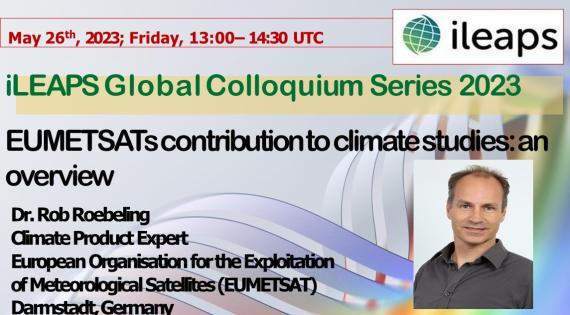
Dr. Rob Roebeling
Dr Roebeling holds a PhD in Environmental Sciences 2008 from Wageningen University, on
Cloud Properties Retrievals from Satellite Observations. He has more than 20 years’ experience in the field of
boundary layer meteorology, crop growth modelling, radiative transfer of the cloud atmosphere and multi
sensor remote sensing . He joined EUMETSAT in 2011 as Climate Product Expert, where he led
the climate data records generation team From 2008 till 2018. Dr Roebeling is involved in coordinating international efforts to better serve
the climate research community with these records, and coordinates activities to enhance the application of
EUMETSAT’s climate data records in climate applications.
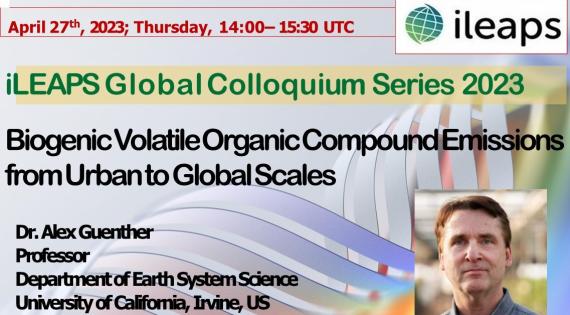
Prof. Alex Guenther
Prof. Guenther received a PhD from Washington State University and then led the Biosphere Atmosphere
Interactions Section of the Atmospheric Chemistry Division in the National Center for Atmospheric Research
for several decades He is now a professor in the Department of Earth System Science at the University of
California, Irvine His research is focused on understanding, quantifying, and simulating the processes
controlling emissions of trace gases and particles into the atmosphere and their role in the earth system and is
described in over 400 peer reviewed publications with an H index (Google Scholar) of more than 110 He is a
Fellow of the AGU and AAAS, an ESI Highly Cited Researcher and a recipient of the AGU AS Kaufman Award He
has led multidisciplinary field studies on six continents from the Amazon to the Arctic and is also the lead
developer of the widely used MEGAN biogenic emission model
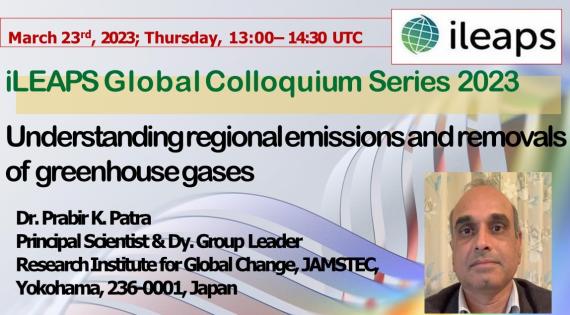
Dr. Prabir K. Patra
Dr. Patra is the principal scientist and deputy group leader at JAMSTEC, Yokohama, Japan, and a visiting
professor at Chiba University. He has completed his Ph D from Gujarat University, India in 1998. He moved to JAMSTEC in 2001 and his research focussed on simulating concentration, sources and sinks of all major greenhouse gases, some of the ozone depleting substances using atmospheric chemistry transport models. His research extensively uses measurements of atmospheric and oceanic variables by in situ and remote sensing techniques. He has published more than 165 peer reviewed articles, contributes to all 3 GCP GHG budgets and served as a Lead Author of the IPCC AR 6.
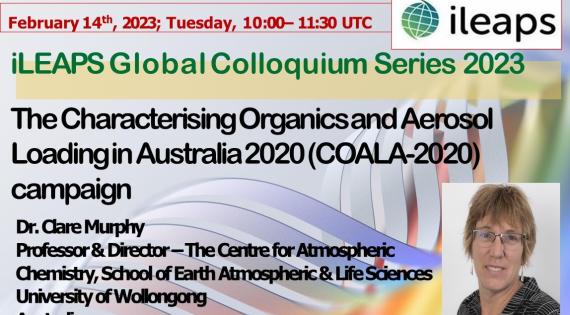
Prof. Clare Murphy
Prof. Murphy is the Director of the Centre for Atmospheric Chemistry at the
University of Wollongong, Australia. Her research is focused on understanding the changing composition and
chemistry of the atmosphere, with long term interests in fire emissions, air quality and remote sensing of the
atmosphere. She currently serve as co chair of the IGAC project and as a member of the International Commission on Atmospheric
Chemistry and Global Pollution iCACGP. Before emigrating
to Australia in 2002 she worked for 12 years as a government scientist in the UK’s National Physical Laboratory
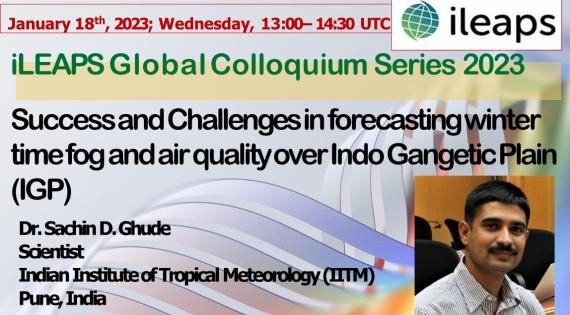
Dr. Sachin Ghude
Dr Ghude is a Scientist at Indian Institute of Tropical Meteorology, Pune an Autonomous institute of
Ministry of Earth Sciences, Government of India. He is also adjunct Professor at Department of Environmental
Sciences, Savitribai Phule Pune University, Pune, India and member of international Commission on Atmospheric Chemistry and
Global Pollution iCACGP and Monitoring, Analysis, and Prediction of Air Quality (MAP AQ). He is leading Winter fog Experiment WiFEX in India and a research
group on atmospheric chemistry and modeling. He has published more than 50 research publications in high
impact factor journals Recent research addresses understanding of atmospheric chemistry of reactive species
and its linkage to air quality, vegetation, human health and climate specific to India.
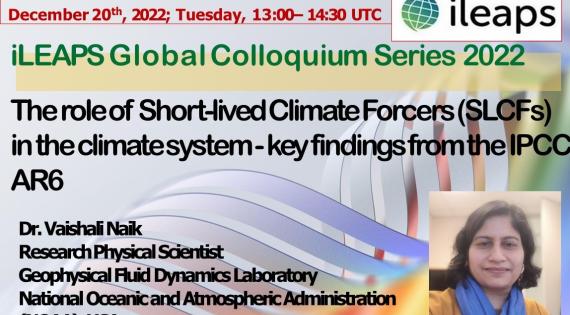
Dr. Vaishali Naik
Dr. Naik is a research scientist at NOAA's Geophysical Fluid Dynamics Laboratory. Her research interests are in atmospheric chemistry and composition, climate change, air pollution, biosphere-atmosphere interactions. She has contributed to the fifth and sixth assessment reports of the Working Group I of the Intergovernmental Panel on Climate change (IPCC). She also serves on the advisory board of NCAR's Community Earth System Model (CESM).
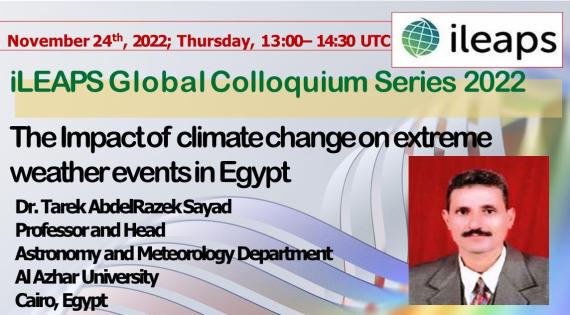
Prof. Tarek AbdelRazek Sayad
Dr. Sayad is a Professor of Applied Climatology and Head of the Department of Astronomy
and Meteorology, Faculty of Science, Al Azhar University, Cairo, Egypt. During the past two decades, he taught many meteorological courses and supervised many M Sc and Ph D theses in various meteorological applications. He also published many research articles in the field of climate, environment
and extreme weather events caused by climate changes and contributed to the publication of two chapters in two books on the impact of climate change on the productivity of agricultural crops. He also worked as a meteorologist in various departments of the Egyptian Meteorological Authority
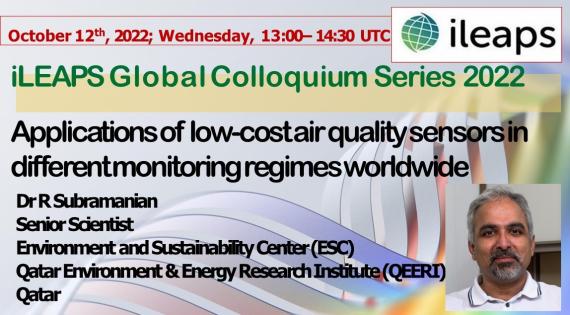
Dr R Subramanian
Dr Subramanian is a Senior Scientist at the Environment and Sustainability Center of the Qatar
Environment Energy Research Institute where he leads QEERI’s research on sensors for air quality
and climate. He is also a research fellow at the Kigali Collaborative Research Centre ( Rwanda), a visiting
researcher at OSU Efluve /CNRS ( France), and an adjunct faculty member in the Department of
Mechanical Engineering at Carnegie Mellon University ( PA, USA). His recent accomplishments include leading the development of the Real time
Affordable Multi Pollutant monitor, co leading the deployment of a 50 RAMP network in and around
Pittsburgh, PA, and establishing the Africa qualité de l’air AfriqAir monitoring network - a collaborative
international effort using reference grade and lower cost monitors in many cities across Sub Saharan Africa
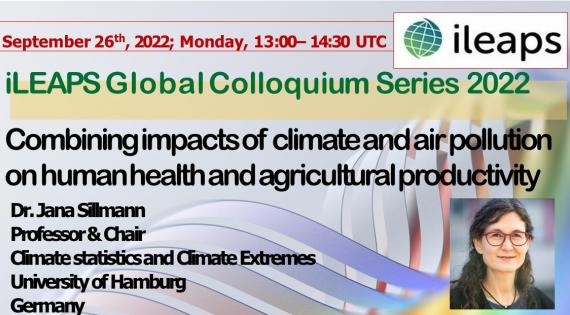
Prof. Jana Sillmann
Prof. Sillmann holds the Chair for Climate Statistics and Climate Extremes at the University of
Hamburg, Research Unit for Sustainability and Climate Risks. She is also a senior scientist at the Center for
International Climate Research in Oslo, Norway. Her research interests focus on relating physical and statistical
aspects of climate extremes to socio-economic impacts and risk assessment. Prof. Sillmann is Lead Author of Chapter 12 “Climate change information for
regional impact and for risk assessment” in the 6th Assessment Report of the Intergovernmental Panel on
Climate Change (IPCC) Working Group 1. She is co-chair of the Knowledge Action Network of Emergent Risks
and Extreme Events (Risk KAN). She is also co-leading activities of the World Climate Research Programme (WCRP) Grand Challenge on Weather and
Climate Extremes and a member of the scientific steering committee of the Integrated Research on Disaster
Risk (IRDR).
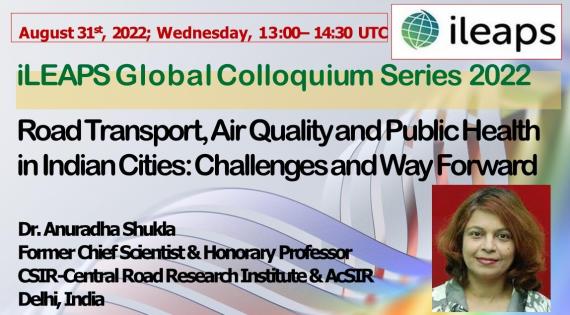
Dr. Anuradha Shukla
Dr. Shukla is a Honorary Professor, Academy of Scientific and Innovative Research ( ACSIR) India.
She is a recipient of the prestigious Fulbright Fellowship for Environmental Leadership Programme and short
term visit to University of Birmingham. She is Chairperson of Committee on Solid
Waste Management, Bureau of Indian Standards and member of Technical Committee on Reduction of
Carbon Footprint in Road Construction and Environment. She was Member
of Expert Appraisal Committee for Projects related to Infrastructure Development, Coastal Regulation Zone,
Building/Construction and Miscellaneous projects, Ministry of Environment and Climate Change 2013 - 2020.
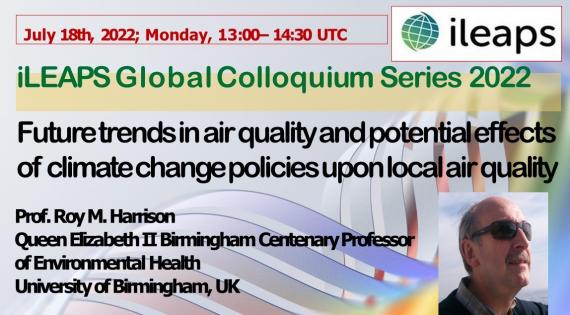
Prof. Roy M. Harrison
Roy
Harrison is Queen Elizabeth II Birmingham Centenary Professor of Environmental Health at the University
of Birmingham, UK, and also Distinguished Adjunct Professor at King Abdulaziz University, Saudi Arabia His
research interests are in air pollution, especially airborne particulate matter He has also been heavily
engaged at the science/policy interface as a member of several government technical advisory groups for the
Department of Health and the Department for Environment, Food and Rural Affairs ( in the U K
including past membership of Defra’s Science Advisory Council He was a contributor to the World Health
Organization Global Air Quality Guidelines and the Guidelines for Quality of Indoor Air He was appointed an
Officer of the Order of the British Empire ( in the 2004 New Year Honours List and elected a Fellow of the
Royal Society in 2017 He is author of over 600 papers in the peer reviewed literature, and is listed by Web of
Science as a Highly Cited Researcher
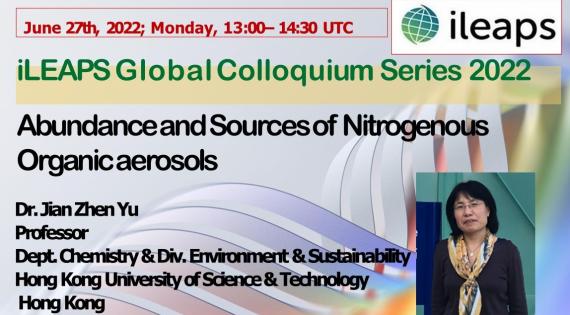
Dr. Jian Zhen Yu
Prof. Jian Zhen Yu is an atmospheric chemist in the Department of Chemistry and the Division of
Environment Sustainability at the Hong Kong University of Science Technology. Her main
research interests include the development of analytical methods for airborne organic compounds,
atmospheric chemistry of various chemical compounds, and chemical characterization of ambient aerosols for
source apportionment and health effects studies. She is a Distinguished Alumna of the Department of Environmental Sciences
Engineering at the Univ. North Carolina Chapel Hill, USA and was elected a fellow of Asian Aerosol Research
Assembly in 2022.
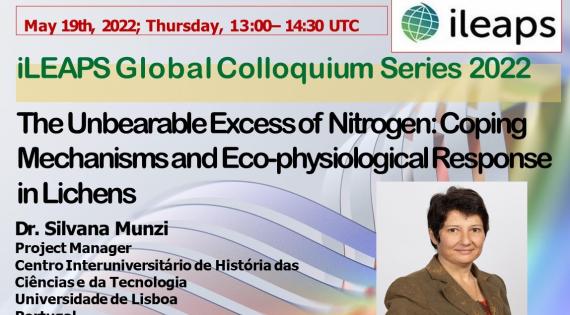
Dr. Silvana Munzi
Dr Munzi is a biologist, who obtained a PhD scholarship at the University of Siena, where she developed her
research on eco-physiological parameters in lichens under nitrogen stress. In 2014-2016 she was granted a Marie Curie
fellowship at the University of Lisbon where she investigated the mechanisms of nitrogen tolerance/sensitivity in
lichens. For the following 5 years, she was Assistant Researcher at the same institution in the Plant-Soil Ecology
group continuing her work on lichens and on the concept of symbiosis in general, aiming at understanding the
mechanisms responsible for their ability to cope with environmental stresses. She is currently manager of an ERC
project in the field of History of Science at the University of Lisbon.
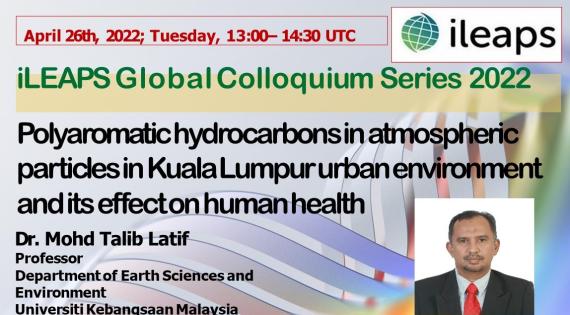
Prof. Mohd Talib Latif
Dr. Latif is a Professor of Atmospheric Chemistry and Air Pollution at the Department of Earth
Sciences and Environment, Universiti Kebangsaan Malaysia; and a fellow of the Malaysian Academy of Science.
He completed his BSc in Chemistry and MSc in Environmental Science at Universiti Kebangsaan Malaysia and his
PhD at the School of Environmental Science, University of East Anglia, United Kingdom. Currently, he is a
Chairman of the Sustainable Resources, Environment and Smart Living Research Cluster at Universiti
Kebangsaan Malaysia. His main research work included the composition of atmospheric aerosols, atmospheric
gases such as surface ozone and volatile organic compounds. In 2018 he received the Top
Research Scientist Malaysian Award from the Academy of Science Malaysia for his research and publication.
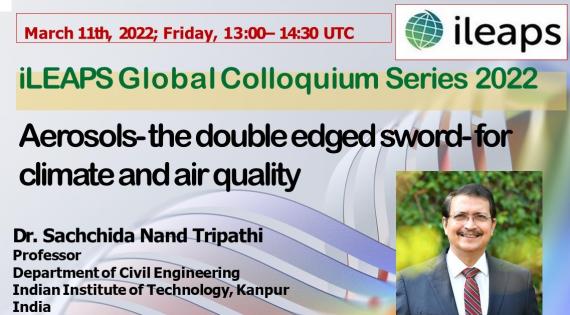
Prof. Sachchida Nand Tripathi
Dr. Tripathi is a Professor of Civil Engineering at IIT Kanpur, India. His research focuses on air
quality, climate change and nuclear reactor safety. The scientific accomplishments and mobilization of human
resources through Knowledge Network of NCAP, MoEF&CC have made Prof Tripathi a leading scientist with
impactful contributions to India’s air pollution challenges. He is currently holding a prestigious position of National Coordinator in National Knowledge Network
National Clean Air Program, India. He is also awarded with Shanti Swarup Bhatnagar Prize and elected as fellow
for his contributions to science and technology. He was Senior Fellow at NASA GSFC and Visiting Professor at
Georgia Tech University, US Orleans University, France and Tokyo University, Japan
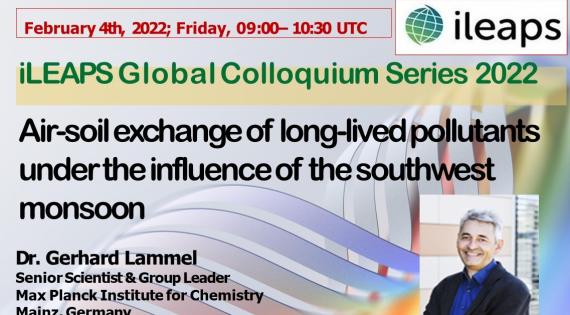
Prof. Gerhard Lammel
Dr. Lammel is a full professor of Environmental Chemistry at the Faculty of Sciences of Masaryk
University, Brno, Czech Republic, and a Senior Scientist and research group leader at the Max Planck Institute for
Chemistry. He has been focusing on atmospheric and aerosol chemistry through field and laboratory experimental
studies and multicompartmental chemistry through modelling and field studies He (co --)authored some 140 papers
in peer reviewed journals cited some 4500 times. He acted as research scientist at the Karlsruhe Research
Centre, Germany, the Lawrence Berkeley Laboratory, USA, the Max Planck Institute for Meteorology University
of Hamburg. He has been teaching at various universities in Germany and the Czech Republic, serves in various
committees, is an editor of the journal ESPR, was Chair of the Board of the German Chemical Society
Environmental Chemistry and Ecotoxicology Division 2007 - 2010 and is Member of the European Chemical
Societies' Division of Chemistry and the Environment (EuCheMS DCE)
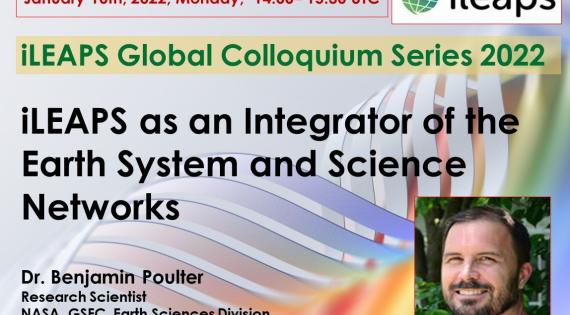
Dr. Ben Poulter
Dr. Poulter received his PhD from Duke University and worked at several European institutions before joining
NASA in 2016 His research interests focus on terrestrial ecosystems and how climate change and land use
change affect vegetation dynamics and biogeochemistry He serves as co chair for the Integrated Land
Ecosystem Atmosphere Processes Study, iLEAPS and the scientific leadership group for the North American
Carbon Program He is a contributing author to the IPCC AR 5 and AR 6 reports and to the United States Fifth
National Climate Assessment
